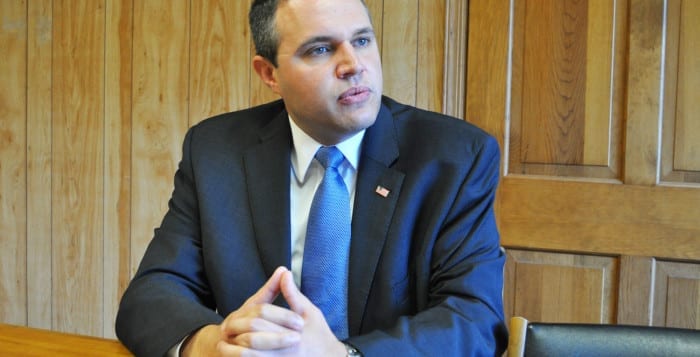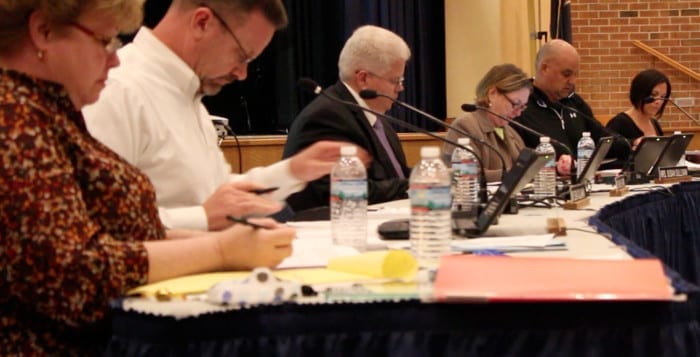Don’t let her 4-foot, 11-inch stature fool you — Rhonda Klch is a force to be reckoned with.
This Long Island native, who was born in Smithtown and lives in Miller Place, opened her first business, American Investors and Collectors, at the age of 19, and saved up enough money from that business to purchase three houses when she was only 23 years old. Now, nearly two decades later, this mother of five runs her own business in the mortgage industry, caters to her family and finds the time to give back to her community through the five charities she is involved in.
As part of giving back, Klch joined Long Island Fight for Charity, and is putting on some boxing gloves and plans to step into the ring, again — a notion that was out of Klch’s comfort zone.
“[I] knew it would grab the attention in the business community,” Klch said when asked why she joined the charity, which provides money to organizations like Long Island Community Foundation, a nonprofit that connects donors with charitable organizations within their community, and PinkTie.org., a network of real estate professionals that raise funds for breast cancer research. “[It] became a buzz, which allowed me to express and to advocate for what the charities were doing.”
Klch trained and fought for the organization last year, raising $3,800. Although she is currently nursing a minor injury, she is accepting donations while she hopes to compete in her next match for Long Island Fight for Charity scheduled for Nov. 23.

Klch is now the president and CEO of her company, Equity First, which assists business residents who are experiencing financial difficulties. She established her current business in October 2003, but her goal wasn’t simply to make money and grow her demanding business, it was also to give back to her community — starting with those experiencing financial hiccups.
“There’s a bunch of people who have amazing resources,” Klch said. “If you’re not utilizing your resources for good, it goes to waste.”
Around seven years ago, Klch became more involved in community service. She worked alongside Building Hope, a charity that renovates the homes of families facing a crisis — families who may need wheelchair ramps in their homes upon a devastating injury were accommodated. But renovating the homes wasn’t an issue for these families, sustaining the home was the issue. According to Klch, no one checked the financial status of these families — some families risked losing the home following the renovations. Now Klch’s company conducts financial reviews for these families to ensure they don’t lose the house.
“Her commitment to giving back to her community is second to none,” Mark Legaspi said about Klch. “She really thinks of other people before she thinks of herself.”
Legaspi is the president of Legaspi Associates Inc, which aims to provide quality service regarding life insurance. Legaspi is also a board member, alongside Klch, for a veteran-minded charity called Easter Seals.
When Klch first decided to become involved with Long Island Fight for Charity, her family thought she was crazy.
“You don’t want to watch somebody get hurt,” said Klch’s husband Stephen. “But at the same time, because it was for charity … it’s not to bash somebody, but the concern was there because it’s a real fight.”
Klch and her husband got married 16 years ago. For several years, Klch was the main breadwinner, while her husband catered to the kids. According to Stephen Klch, he left his job and didn’t have to worry about hiring a babysitter to help look after their children. Now he works for his wife’s company, handling the budget and fixing up the homes.
While giving back to the community was important to Klch’s wife, helping others became a family affair as the children got older.
“We kind of live in a bubble,” Klch said. “We want them to have a reality check on what is in their neighborhood and what other families are struggling through.”
According to Stephen Klch, his children partake in events like Equity First’s project called Holiday Dreams. The company established the initiative last year and aims to provide holiday cheer to homeless children or those in transition. This year will be the second time the company is holding the event. Last year, they helped 200 children. This year, the company is committed to helping 250 children and 50 veterans, according to Rhonda Klch.
From her business to her family life and participation in several charities, Klch credits time management and delegation skills for her ability to balance her busy life. Her nonstop attitude when taking on and executing projects is one reason Maria Frey, president and founder of Executive Consultants of New York, clicked with Klch.
Frey said people like Klch show that there are still people who care about those around them.
“[Rhonda] solidifies to me that there are other people in the community who want to make a change and want to help, and she is definitely one of them,” Frey said. “I feel honored to know her.”























